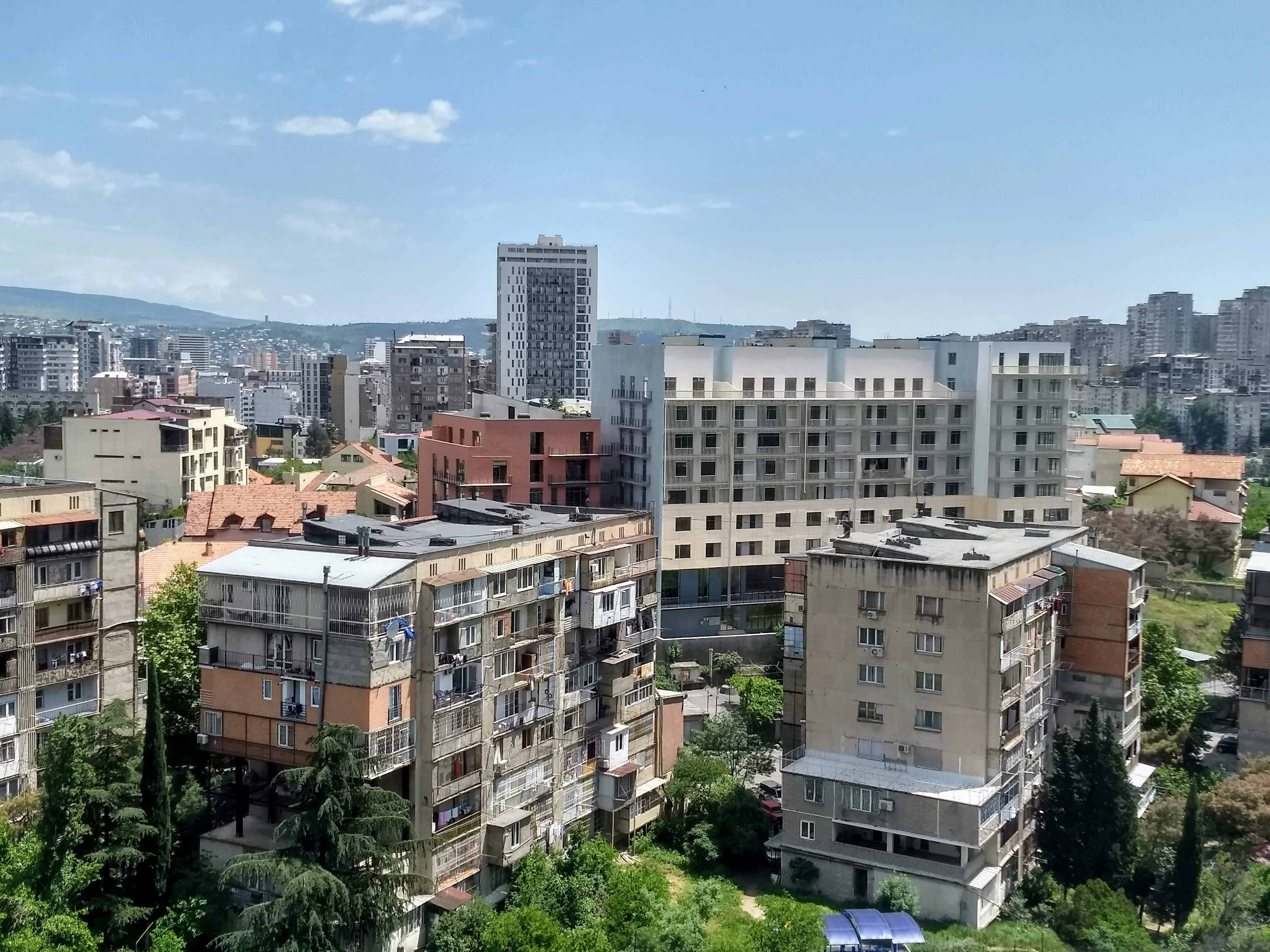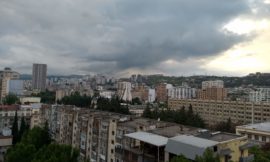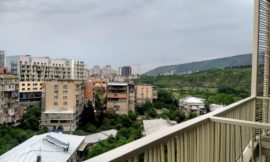Finding an apartment in Tbilisi is a pretty straightforward process—even easier than in my home country of the US, I’d say. Once you pick a neighborhood, settle on a price range, and figure out the channels you’re going to go through, you’re pretty much good to go. As of 2019, there are more apartments than people in Tbilisi, especially in up-and-coming areas like Saburtalo, so renters are in a pretty good position.
If you’ve read the previous posts about renting apartments in Tbilisi, you’ll have a pretty good idea of what it’s like to get settled in here—at least according to my limited research and experience. If you haven’t here’s the short version, followed by a few general tips I’ve found to be true.
Step 1: finding a neighborhood
There are lots of cool neighborhoods in Tbilisi, but the coolest ones tend to be down south in and around Old Tbilisi (ძველი თბილისი, Dzveli Tbilisi), between the Marjanishvili and Avlabari subway stops. These also tend to be older, more traditional buildings and come at a higher price.
Areas a little more removed from the downtown, like Saburtalo, are newer and cheaper, but definitely don’t have as much going on. You’ll have to catch a subway or bus (.5 lari, 30 minutes) or a Bolt (~5 lari, 15 minutes) to get down to the nice things, but your day-to-day life will probably be a bit more convenient and your apartment may be nicer.
Use real estate websites like MyHome.ge to find examples of what you can accept in terms of apartments and prices in different neighborhoods, and use your own feet and eyes to get a feel for how you’d like them.
Step 2: establishing a price range
This is important, since what you can get for your money really depends on which neighborhood you’re looking at. If you’re indifferent between an old place in Vera for $400 and a shiny new place in Saburtalo for $400, you’ll probably do fine. If you’re a little more picky about neighborhood and amenities, look around on Facebook and real estate sites to get a realistic idea of what you can expect.
Unless it’s explicitly stated, list prices aren’t final. If you’re using an agent, they may be able to negotiate higher-priced apartments into your range; if you’re doing it directly, you have a chance to break out the negotiation skills for yourself.
Step 3: the hunt
Depending on how much legwork you feel like doing, you can either use an agent or try to find and deal with owners directly. If you decide to use an agent, check the local Facebook groups (Georgian Wanderers/the million-odd rental groups) to find reliable ones and check out what kind of places they’re posting. If you want to go it on your own, look for owner listings on the real estate sites (like MyHome.ge, Place.ge, etc.) and Facebook groups.
General tips
- Tbilisi is big, but not that big. Getting around is cheap and fairly fast, so if you’re okay with a little travel time, living outside of the center is no big deal.
- All other things equal, higher floors often cost more. To get the best deal in a given building, you’ll typically have to be content with a view that’s less “skyline” and more “another building” or “trees.”
- Negotiating is fine, but prices are already fairly low, so don’t expect big discounts. If you’re weighing several options, though, it doesn’t hurt to get competing bids.
- There are a lot of fake listings on the real estate sites. Be prepared to get the run-around on those, especially if you respond to an agent listing.
- Apartments are quite cheap per square meter, but they tend to have a lot of square meters. In Thailand I paid about $11 USD per square meter per month for 35 square meters, but here I’m paying $7.5 USD per m2 per month for 60 square meters. Cheaper on a per-unit basis, more on a per-item basis. Not many apartments (at least in new buildings) are 35 m2 here that I’ve seen. A one-bedroom is likely to be at least 45.
- Lease lengths seem very negotiable. 3 months is probably the minimum that many landlords will accept without negotiating a higher rent (at least if they’re going through an agent), but staying for 6 months is fine in most situations. Some advertisements will say they only want tenants for a year, but if the apartment has been sitting empty for some time, they probably won’t mind any odd time. Our lease is for 8 months, for example.
- Furnished apartments are pretty much the norm, especially if you’re going through any sort of foreigner rental channel. Expect beds, furniture, dishes, TVs—pretty much every basic thing that would be really annoying to buy and bring in by yourself.
- Except microwaves. Most apartments we visited didn’t really seem to have these. I’ve heard rumors that Georgians think they’re not healthy to cook with, but I’ve seen the food they eat and I feel like that’s a weird place to draw the line. You might be able to find a used microwave on the Expat Marketplace group (I did) or at an appliance store, where prices typically start around 160 lari (~60 USD)
- You’ll probably be using a key. Even the newest, shiniest buildings are all about keys. Not my favorite thing—I got spoiled by digital keypads in Asia—but a minor annoyance.
- Don’t expect a “standard” apartment. Apartments in Georgia are often built with a bunch of unfinished shells in them, which the owners can then design and outfit as they please. If you tour 5 different apartments in the same building, you may see 5 different layouts, color schemes, sets of appliances, furniture options—all of it. I’m not exactly sure how it works—I’m sure a lot of people hire the same designers and go with the same schemes—but I found all the variety pretty enjoyable. The downside of this is that some people cheap out on the designers and the furnishings, and it definitely shows. One of the apartments we toured had a really nice situation and view, but half the furniture felt like it had been pulled from the Soviet era and the other half felt like the pre-Soviet era.
Tbilisi is a pretty easy city to find an apartment in. As long as you come with a budget appropriate to what you want, there are a lot of places just waiting for tenants and people eager to connect you (for a fee from the owners, of course).
That about wraps it up for my “how-to” series! If anything I’ve said isn’t accurate or could use some expansion, feel free to leave a comment or drop me a line J
Next up, I’ll be running you through our own apartment hunt, so as to at least contribute a bit to the limited collection of stories currently out there.









Hi Guys,
First of all, thank you so much for your blog… It’s a reference for me and my wife… We are arriving in Georgia next month… We will spend some days in Kutaisi, then, we will go to Tbilisi, and we will follow your teachings about how to rent a good place…
But we have a doubt… We are from Brazil, and we will exchange our currency (brazilian real, BRL) to euro or dollar (EUR or USD)…
We would like to pay our rent in USD (ou EUR) because we lost just one time on exchange… If we pay our rent in lari (GEL), we will lost TWICE, converting BRL to EUR/USD, and, then, again from EUR/USD to GEL…
Can you tell us if we can pay our rent in USD or EUR without a problem?
Hey there! Sorry I didn’t see this comment for a long time, but for future reference, yes–you should be able to pay rent in USD no problem. Most landlords prefer it, even though it’s not technically legal 😀